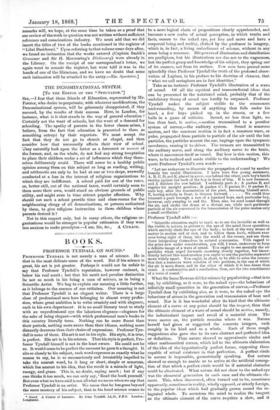THE DENOMINATIONAL SYSTEM. [To THE EDITOR OF THE "SPECTATOR."] fear
that those friends of Education, represented by Mr. Forster, who desire to perpetuate, with whatever modifications, the Denominational system, will be grievously disappointed, if they succeed, by the results of their success. Here, in London, for instance, what is it that stands in the way of general education ? Certainly not the want of schools, but the want of a demand for schooling. The apathy of parents in the lower classes arises, I believe, from the fact that education is presented to them as something octroye by their superiors. We must accept the fact that they do not go to church or chapel, and then consider how that necessarily affects their view of school. They naturally look upon the latter as a forecourt or annexe of the former, and, on the whole, do not feel any strong temptation to place their children under a set of influences which they them- selves deliberately avoid. There will never be a healthy public opinion among them on this subject so long as reading, writing, and arithmetic are only to be had at one or two shops, avowedly conducted at a loss in the interest of religious organizations to which they are indifferent. A school paid for out of the rates, or, better still, out of the national taxes, would certainly seem to them more their own, would stand on obvious grounds of public utility, and might even in time attract popular affection. Why should not such a school provide time and class-rooms for the neighbouring clergy of all denominations, or persons authorized by them, to give religious instruction to those children whose parents desired it ?
Not in this respect only, but in many others, the religious or- ganizations would be stronger in popular estimation if they were less anxious to make proselytes.—I am, Sir, &c., A CURATE.






























 Previous page
Previous page